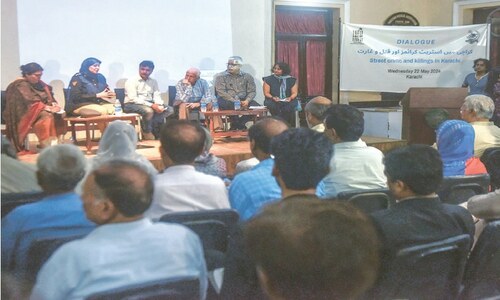KARACHI, May 31: A division bench of the Sindh High Court on Friday adjourned the hearing of a writ petition filed by 21 legal heirs of the late Nawab of Junagadh, Sir Mahabat Khanji, for distribution of his movable and immovable property in accordance with the Muslim law of inheritance.
The petitioners — Lady Saeeda Sultana, widow of the Nawab, her daughters Sultan Bakht, Noor Bakht, Zohra Bakht, Inayat Bakht and Kulsum Bakht; sons Himmat Khan, Sakhawat Khan, Yousuf Khan, Shahryar Khan, Sadiq Khan and Sayed Ali Khan; and seven children of deceased daughter Taj Bakht — said the Junagadh state acceded to Pakistan on Sept 15, 1947, by virtue of an instrument accepted by the then governor-general, Quaid-i-Azam Mohammad Ali Jinnah, and endorsed by the Constituent Assembly in February 1949.
His Highness Mahabat Khanji, the ruler of Junagadh, died on Nov 7, 1959, leaving behind a widow and 17 direct descendants.
His eldest son, Nawab Dilawar Khanji, was officially recognized as his successor as a ruler.
Meanwhile, on Aug 22, 1961, the then president (Ayub Khan) promulgated the Acceding States Property Order, 1961. By virtue of its Article 3, “any question arising directly or indirectly between persons claiming to be the heirs and successors of the ruler of a state or claiming to succeed to the state concerning devolution and distribution of any property of that state or of the ruler” was to be decided by an order of the central government.
The jurisdiction of courts in matters falling within the purview of the order was ousted.
The question of devolution and distribution of the Junagadh ruler’s property was accordingly referred to the central government, which asked the then commissioner of Karachi (G.A. Madani) to hold an inquiry and make his recommendations to the government.
A notification was issued on May 20, 1963, which declared the late ruler’s personal property to be his state property and vested the whole of it in the new ruler, Nawab Dilawar Khanji, under the customary law of primogeniture.
The notification was manifestly violative of the West Pakistan Muslim Personal Law (Shariat) Application Act, 1962. The enactment declared that “notwithstanding any custom or usage, in all questions regarding succession, whether testate or intestate, special property of females, betrothal, marriage, divorce, dower, adoption, guardianship, minority, legitimacy or bastardy, family relations, wills, legacies, gifts, religious usages or institutions, including waqf, trust and trust properties, the rule of decision, subject to the provision of any enactment for the time being in force, shall be Muslim personal law (Shariat) in cases where the parties are Muslims.”
The heirs agitated their right to the late ruler’s personal property without success. Eventually, the ministry for states and frontier regions informed Princess Sultan Bakht in her capacity as attorney for her brothers and sisters and their children that the “central government” had been substituted by the “provincial government” in the 1961 presidential order and that she should take up the matter with the Sindh governor and the government. Representations made to the provincial authorities, however, proved equally futile.
The petitioners said they were too poor to initiate any legal action. Most of them were employed as drivers, domestic servants and in other “humble vocations”.
It was only in 1986, after exhausting all ordinary remedies, that they were able to spare funds for filing a petition before the high court.
No property of the state of Junagadh, they asserted, became a part of Pakistan and the entire personal assets of the late ruler were liable to be distributed among his heirs in accordance with the Hanafi personal law, which they subscribed to. While the eldest son could succeed Sir Mahabat Khanji as “ruler”, he could not inherit all his property under the Muslim law.
The petition came up before a bench, comprising Chief Justice Saiyed Saeed Ashhad and Justice Ghulam Rabbani, but was adjourned at the request of the petitioners’ counsel, Barrister Naeemur Rahman.














































Dear visitor, the comments section is undergoing an overhaul and will return soon.